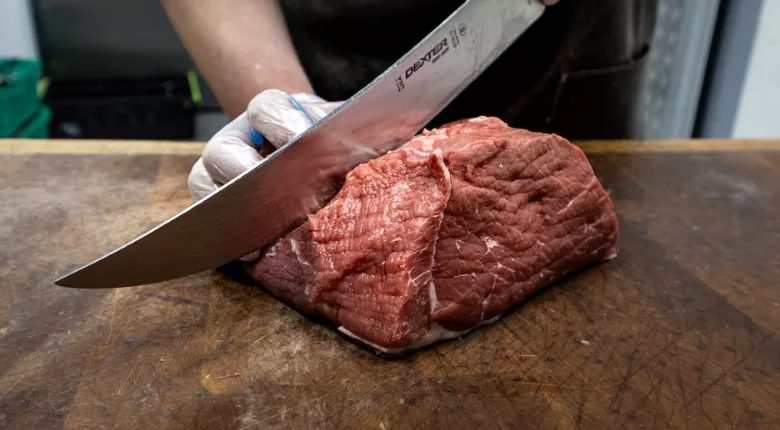USDA-FSIS FY 2024 Strategic Plan Focuses on Salmonella Reduction, Improving Inspections, Helping Small Establishments

Image credit: Kyle Mackie via Unsplash
The U.S. Department of Agriculture’s Food Safety and Inspection Service (USDA’s FSIS) has published its annual plan for fiscal year (FY) 2024, which acts as a guide for the agency’s mission to prevent foodborne illnesses associated with meat, poultry, and egg products. The FY 2024 Annual Plan is the second annual plan released under the FSIS 2023–2026 Strategic Plan.
The plan highlights the activities FSIS intends to carry out in 2024 and provides a detailed framework for FSIS to follow as it strives to fulfill its three strategic goals:
- Prevent foodborne illness and protect public health
- Transform inspection systems, policies, and scientific approaches
- Achieve operational excellence.
Strategic Goal 1—Prevent Foodborne Illness And Protect Public Health
Regarding Strategic Goal 1, preventing foodborne illness and protecting public health, FSIS will continue to prioritize its goal of reducing human cases of salmonellosis attributable to contaminated poultry products. The agency will work on rulemaking for its proposed regulatory framework for Salmonella, which was introduced in October 2022 and suggests implementing an enforceable final product standard by declaring the pathogen as an adulterant in poultry products. FSIS will also proceed with finalizing its plan for its proposed determination to declare Salmonella an adulterant in breaded stuffed raw chicken products, which builds upon its proposed regulatory framework for the pathogen.
Other objectives and desired outcomes of Strategic Goal 1 include preventing adulteration and misbranding and reducing foodborne illnesses from FSIS regulated products by strengthening compliance with food safety statutes and regulations, achieving pathogen reduction, assuring labeling is truthful and not misleading, strengthening food safety practices throughout the supply chain, enhancing collaborative response to foodborne illness outbreaks and other food safety incidents, and raising consumer awareness of food safety.
There are also several partnerships and collaborations related to Strategic Goal 1 that FSIS will continue to foster throughout FY 2024, including:
- Joint oversight of human food produced using animal cell culture technology between FSIS and the U.S. Food and Drug Administration (FDA)
- The PulseNet national laboratory network that connects foodborne illness cases to detect outbreaks, let by the U.S. Centers for Disease Control and Prevention (CDC)
- The Farm-to-Fork Food Safety Working Group, which aims to improve preharvest food safety through a One Health approach and involves FSIS, USDA’s Animal and Plant Health Inspection Service (APHIS), CDC, state departments of public health and agriculture, and livestock and poultry industries
- The Interagency Foodborne Outbreak Response Collaboration (IFORC), which strives to improve the coordination of FSIS’s, CDC’s, and FDA’s foodborne outbreak responsibilities.
Strategic Goal 2—Transform Inspection Systems, Policies, and Scientific Approaches
Under Strategic Goal 2—transforming inspection systems, policies, and approaches—FSIS will continue to leverage the most current science, data, and technology to inform its decision making, innovate its laboratory methods, and evaluate the effectiveness of its approaches to verifying that regulated industry meets food safety requirements. The agency will also specifically strive to optimize the design of its sampling programs, already having announced its sampling program priorities and changes for FY 2024 weeks prior to the publication of the present annual plan.
At the same time, FSIS also aims to ensure accessibility to its data to further promote transparency. Additionally, by enhancing its business infrastructure and technology capabilities, FSIS will provide advanced platforms for the agency’s work.
Looking for quick answers on food safety topics?
Try Ask FSM, our new smart AI search tool.
Ask FSM →
Strategic Goal 2 Partnerships and Collaboration that FSIS will continue to prioritize during FY 2024 include:
- The National Advisory Committee on Meat and Poultry Inspection (NACMPI), which advises USDA’s Secretary of Agriculture on state and federal programs with respect to meat and poultry inspection, food safety, and other matters related to the Federal Meat Inspection Act and Poultry Products Inspection Act
- The National Advisory Committee on Microbiological Criteria for Foods (NACMCF), which provides scientific advice and/or peer reviews to federal food safety agencies for use in the development of an integrated national food safety system approach that assures the safety of domestic, imported, and exported foods
- FSIS research collaborations, which are communicated through the FSIS Research Priorities webpage
- Participation in the International Association for Food Protection (IAFP) to share data and information concerning meat, poultry, and egg products through professional development opportunities, program committees, forums, symposia and technical talks, and the IAFP Annual Meeting.
Strategic Goal 3—Achieve Operational Excellence
Finally, to achieve operational excellence (Strategic Goal 3), FSIS will strive to expand recruitment and increase employee retention for mission-critical positions, enhance employee training and professional development, ensure the workplace is equitable, enhance efficacy and efficiency of key business processes, improve customer service, and transform business infrastructure and information technology (IT). These activities will ideally lead to an adaptable, high-performing, and engaged workforce, as well as optimized service delivery.
One of the agency’s main priorities for Strategic Goal 3 is to improve its service for the more than 5,500 FSIS-regulated small and very small establishments. The agency will do this by hosting forums for communication, providing outreach, and publishing additional guidelines designed to assist these establishments in meeting regulatory requirements. An example of this work is the June 2023 NACMPI meeting, which produced reports on how FSIS can enhance outreach and engagement with prospective applicants for FSIS inspection and existing small and very small establishments that already receive FSIS inspection.









